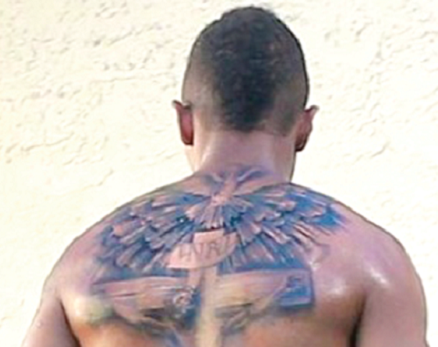
Tattoos gain ground in Ghana
Tattooing, which used to be a popular western culture, seems to have gained acceptance in this country, especially among the youth.
Advertisement
Footballers, musicians and other celebrities are the pacesetters in this regard, proudly showing off their tattooed bodies to their fans.
People tattoo themselves for varied reasons, including aesthetic values, cosmetic effect, sentimental reasons, group identity and religion.
Types of tattoos
According to a dermatologist at the Second Image Beauty School, Mrs Emma Yankey, there are three types of tattoos - permanent, semi-permanent and temporary.
Permanent tattoos, she said, could be highly dangerous to the skin because, “the ink used is highly pigmented, goes into the blood stream and can put one at risk of developing cancer, especially if he or she has a bleached skin.”
Mrs Yankey, however, said the temporary ones could last for a week or two and could be washed off easily while the semi-permanent tattoo could last for three to six months.
According to Mrs Yankey, a major health problem associated with tattooing is a skin condition known as keloid.
Keloid is an overgrowth of tissue at the site of a healed skin injury and usually accompanied by severe itchiness, pain, and changes in skin texture.
“This type of skin condition is commonly found among people with tattoos and we have in recent time recorded a high number of cases of the condition,” she noted.
She said keloid topped the list of the skin condition her outfit had treated over the years.
Other side effects associated with tattooing include watery eyes, skin blemishes and headaches.
How tattoos reflect you
Aside the health implications, Mrs Yankey said many people with tattoos were perceived in a negative light because of the images drawn on their skin.
“I would advise tattoo lovers who for some reasons want to explore the art to rather opt for either the temporary or semi-permanent ones to avoid future complications,” she said.
Why people tattoo
In an interview, a 25- year-old man (name withheld) explained that he got a tattoo just for the love of it, and though people perceive him to be a ‘bad boy’, he actually isn’t.
Describing himself as a responsible young man with a good job, he admitted that having a tattoo had affected his relationship with others, because of the negative perception people have about tattoos.
“Having a tattoo has made me lose some friends because very often people judge me when they see my tattoos,” he stated.
Another person with a tattoo also said that even though she personally admired it, her friends also convinced her it would look good on her because of her complexion.
After having it done, however, she said she realised people began to perceive her as ‘a bad girl’.
She said her woes further worsened when she noticed that as a result of her visible tattoos, she only attracted ‘certain type of men’ whom she didn’t like.
Perception
In a random interview to find out the views of people on tattoos, in parts of Accra, many were of the opinion that cultured people from good homes should not have tattoos.
However, others believed people are gradually moving away from the perception that tattoos are for deviants.
Stephen Agyepong, a graduate of the University of Education, however, said he would definitely not settle down with a woman with a tattoo. He was of the view that such a woman lacked proper upbringing.
He believed that no matter how fashionable tattoos had become they were still meant for a ‘certain group of people’.
Origin
The word tattoo, or tattow in the 18th century, is a loanword from the Polynesian word tatau, meaning "to write".
Tattooing has been practised across the globe since at least Neolithic times, as evidenced by mummified preserved skin, ancient art, and the archaeological record.
The symbolism and impact of tattoos vary in different places and cultures. Tattoos may show how a person feels about a relative or symbol.
Some emblems and symbols are adopted and used by some people to represent toughness and defiance.
Many tattoos in the past served as rites of passage, marks of status and rank, symbols of religious and spiritual devotion, decorations for bravery, sexual lures and marks of fertility.
It was also used to depict pledges of love, punishment, protection, and as the marks of outcasts such as slaves and convicts.



